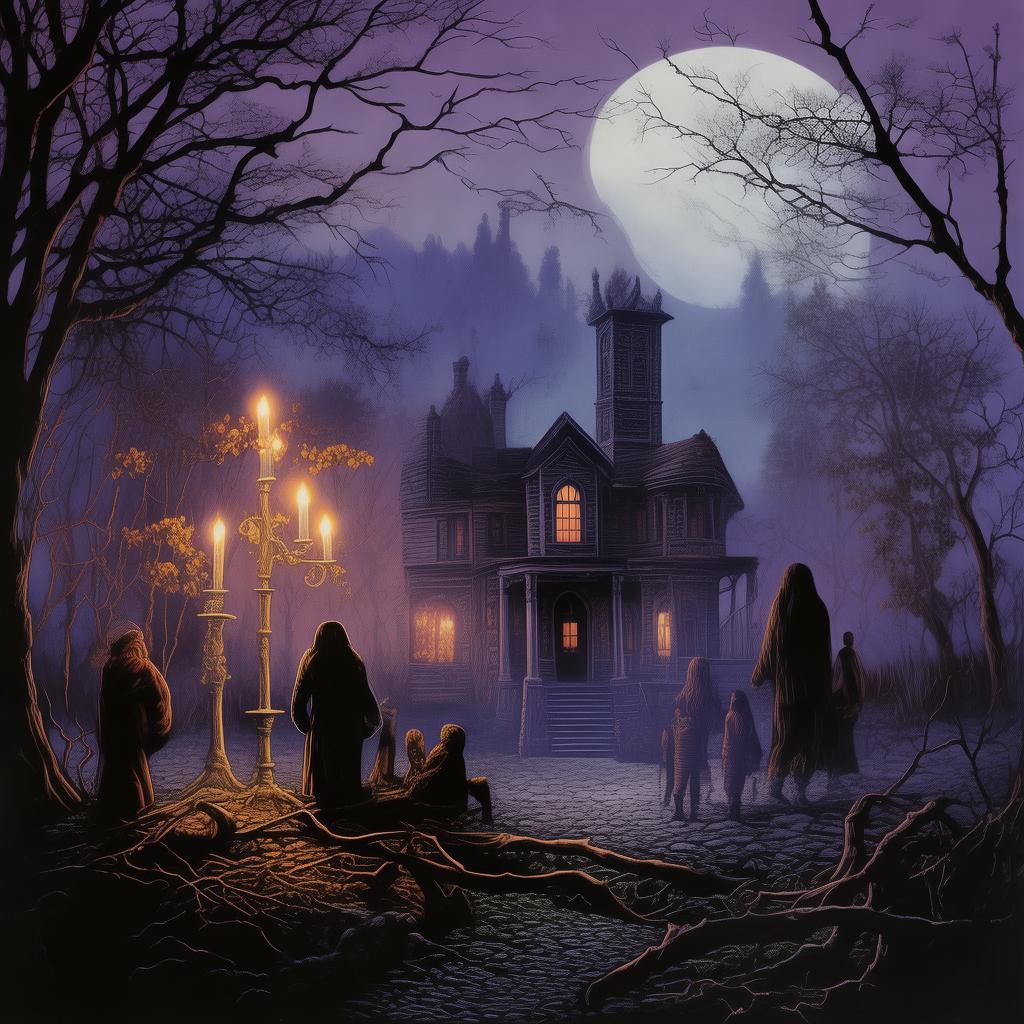The Phantom's Echo in the Old Library
The ancient library, shrouded in the mists of time, was a place of whispers and secrets. Its towering shelves held the wisdom of ages, but none more so than the dusty, leather-bound tome known only as "The Grateful Phantom's Lament." It lay hidden in a far corner, its pages yellowed and its cover cracked, a silent sentinel guarding its enigmatic secrets.
Eliza, the young librarian with a penchant for the obscure, had stumbled upon it one rainy afternoon. The book seemed to call out to her, a siren's song that she couldn't resist. She opened it, and the air around her grew heavy with the weight of the past.
The story began in the late 19th century, in a grand estate that was now little more than ruins. A young woman named Clara had been trapped in the clutches of a demented inventor, a man who had created a machine that could steal souls. Clara's spirit was trapped within the machine, her body left to rot in the inventor's lair.
But Clara was not a spirit without hope. She had found a way to communicate with the living, and her message was one of gratitude. She was grateful to anyone who could free her from the machine, and she promised to repay their kindness.
Eliza read on, her heart pounding with each word. The inventor had been killed, but his machine remained, and Clara's spirit was still trapped. The librarian realized that the book was not just a story; it was a plea for help.
As Eliza continued to read, she began to have strange dreams. She saw Clara, her eyes filled with gratitude, and she heard the sound of a library bell tolling in the distance. The dreams were vivid, almost as if Clara was reaching out to her.

One night, as Eliza lay in bed, the dreams became more intense. She saw Clara in the library, surrounded by flames. The inventor's machine was burning, and with it, Clara's spirit was trapped. Eliza knew she had to act.
The next day, Eliza returned to the library. She had decided to investigate the old estate, to see if she could find the remains of the machine and free Clara's spirit. She traveled to the ruins, her heart heavy with the weight of her mission.
The estate was a haunting reminder of Clara's plight. The once-grand mansion was now a skeleton of its former self, its walls crumbling and its windows shattered. Eliza searched the ruins, her flashlight cutting through the darkness.
Finally, she found it. The remains of the machine were hidden beneath a pile of rubble. With trembling hands, she began to dismantle it. As she worked, she felt a strange presence nearby. She turned to see a figure standing in the shadows, a woman with eyes that seemed to burn with gratitude.
"Eliza," the woman said, her voice echoing through the ruins. "You have done this. You have freed me."
Eliza looked at Clara, her eyes wide with disbelief. "How? How did you know I would come?"
"I heard your dreams," Clara replied. "I knew you were the one who could save me."
As Clara's spirit left the machine, Eliza felt a wave of relief wash over her. But she also felt a sense of responsibility. Clara had been grateful to anyone who could free her, and now Eliza knew that she had a duty to fulfill.
Clara's spirit thanked Eliza and then faded away, leaving behind a single, delicate rose. Eliza picked it up, its petals soft and fragrant. She knew that Clara's gratitude would stay with her, a reminder of the kindness she had received.
Eliza returned to the library, the rose in her hand. She placed it on the shelf where "The Grateful Phantom's Lament" lay, and as she did, she felt a sense of peace settle over her.
The library, once a place of whispers and secrets, now seemed to hold a new secret, one of gratitude and hope. Eliza knew that Clara's story would be told, and that her spirit would live on, a reminder of the power of kindness and the enduring bond between the living and the dead.
As days turned into weeks, Eliza continued to care for the library, her heart filled with a newfound purpose. She had freed Clara's spirit, but she had also found her own. The Grateful Phantom's Lament was more than a book; it was a testament to the power of gratitude and the unbreakable bond between the living and the departed.
✨ Original Statement ✨
All articles published on this website (including but not limited to text, images, videos, and other content) are original or authorized for reposting and are protected by relevant laws. Without the explicit written permission of this website, no individual or organization may copy, modify, repost, or use the content for commercial purposes.
If you need to quote or cooperate, please contact this site for authorization. We reserve the right to pursue legal responsibility for any unauthorized use.
Hereby declared.









